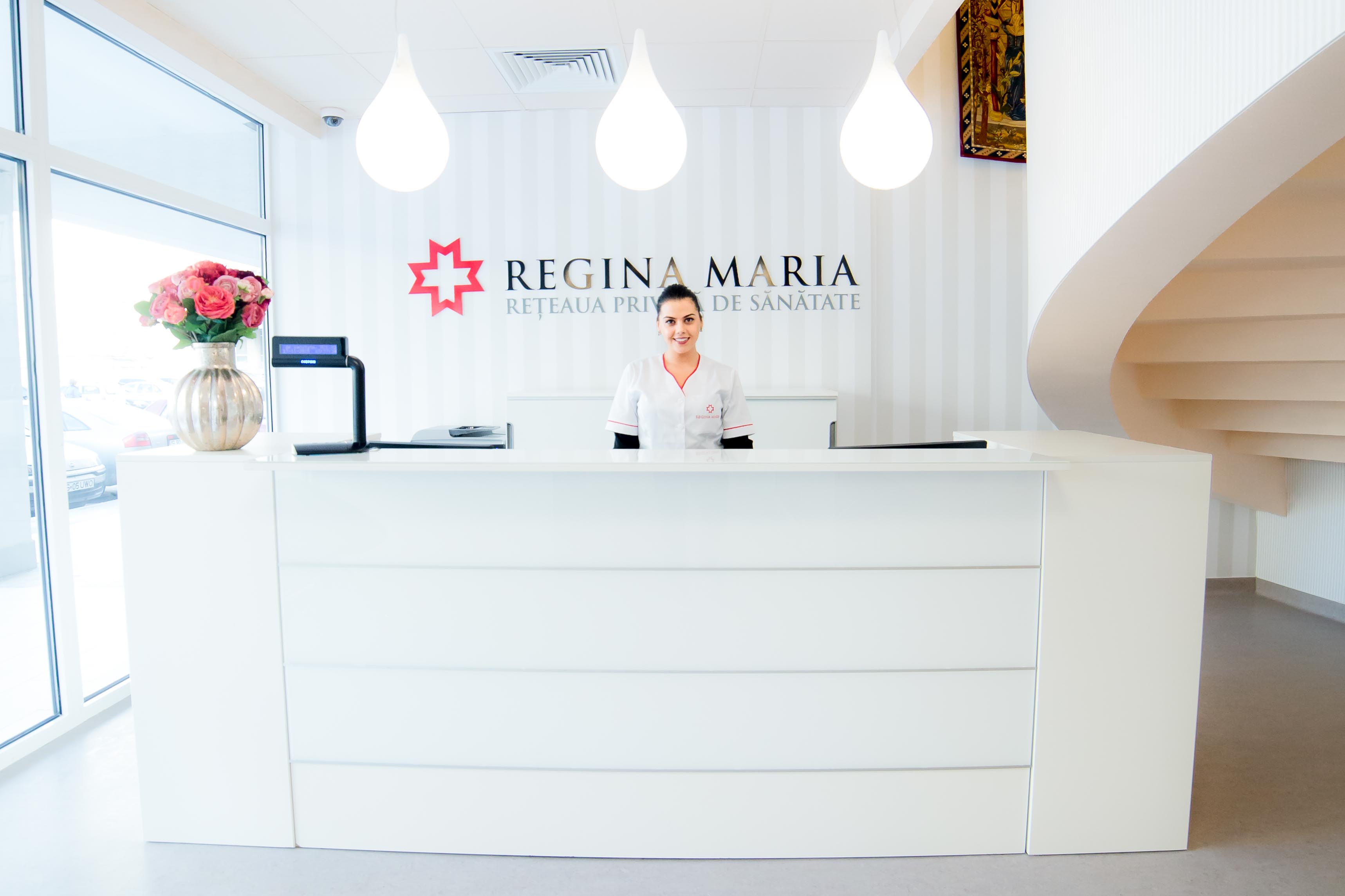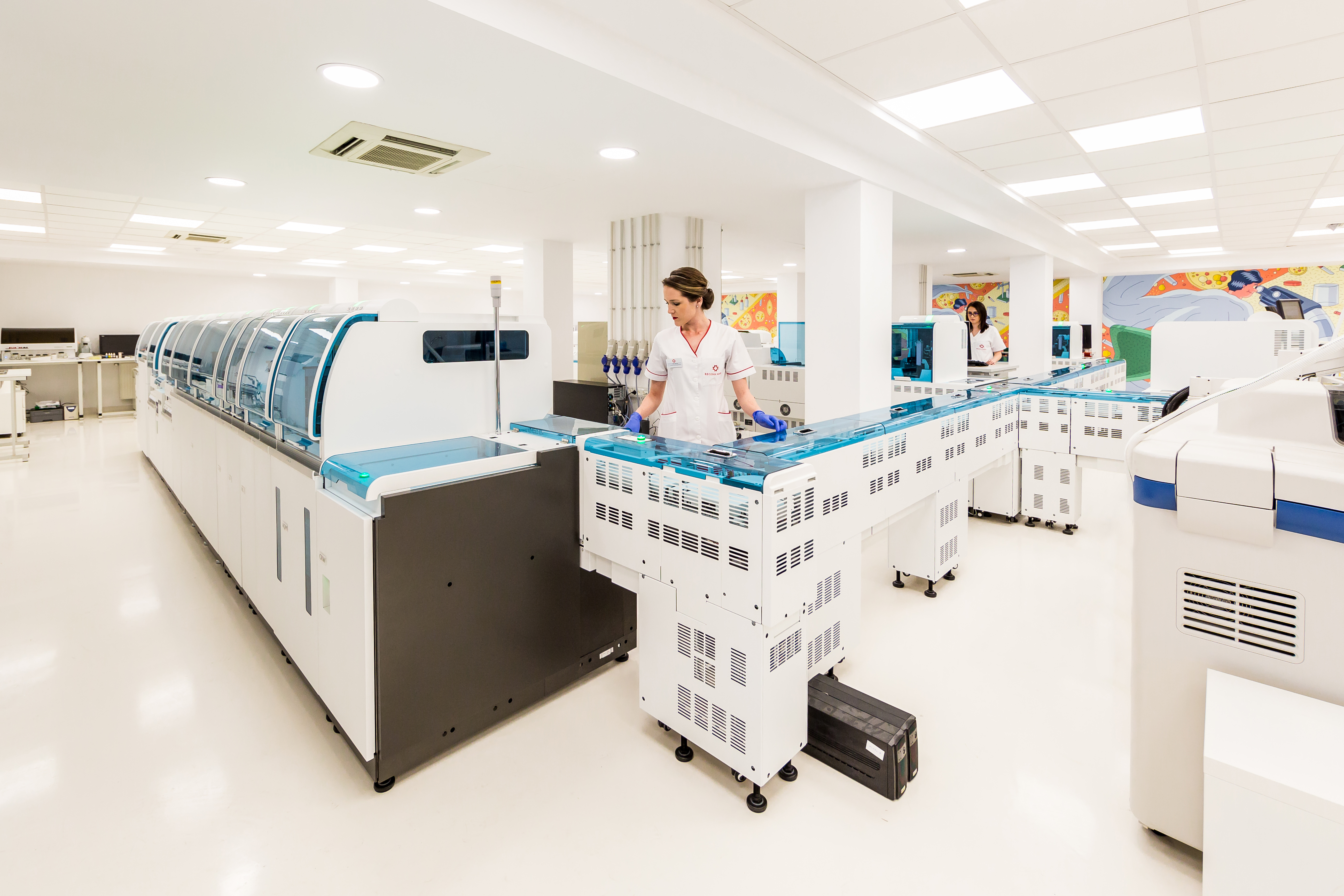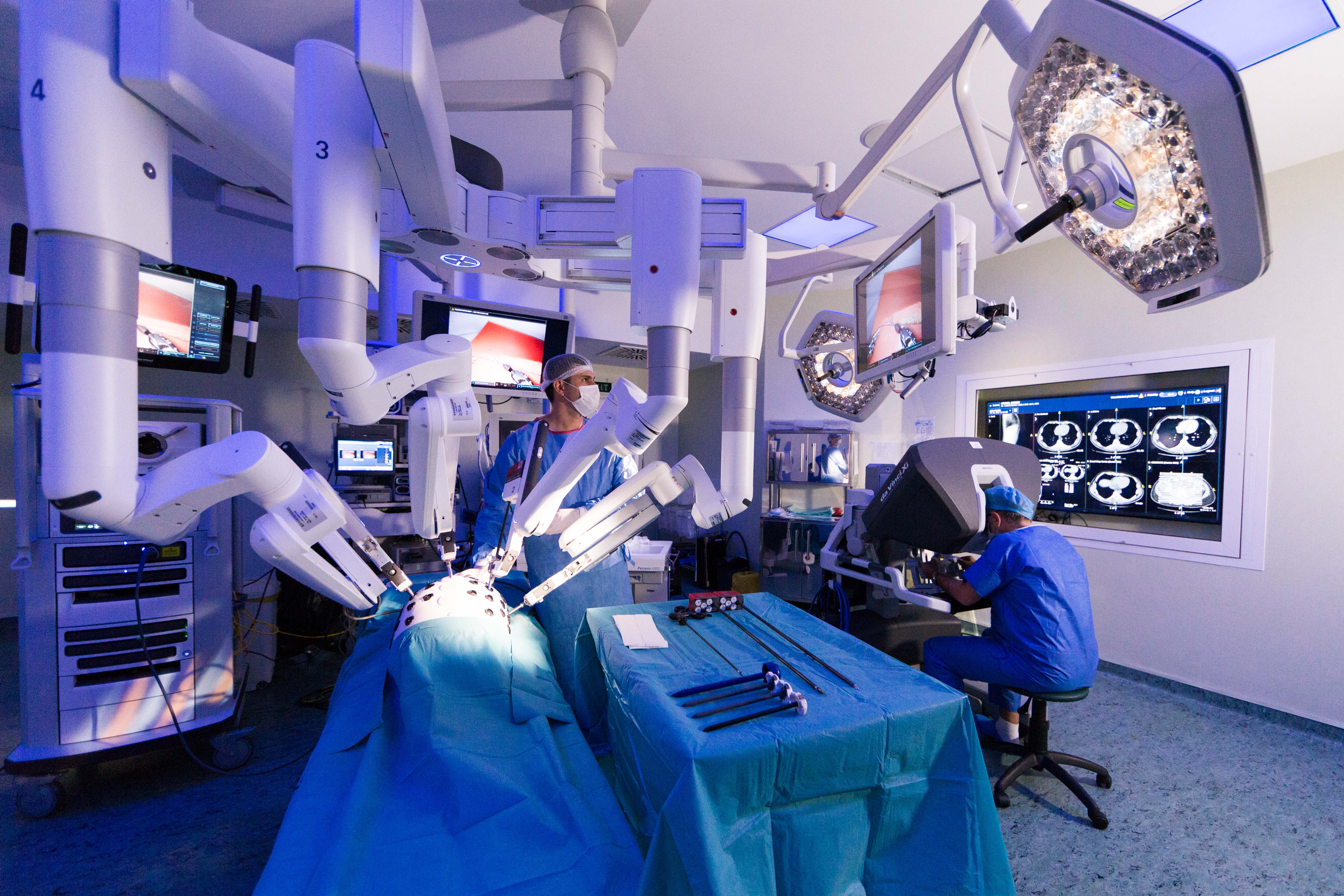:quality(80)/business-review.eu/wp-content/uploads/2020/10/Hires_NEAN2228.jpg)
Celebrating its 25th anniversary on the local market this year, REGINA MARIA has been able to maintain its leading position on the local private healthcare sector by focusing on four major development pillars – investments in infrastructure, medical leadership, education, and digital leadership. Operating on a very competitive market, innovating in the corporate subscriptions segment and pioneering some of the most courageous medical interventions have always been at the core of its strategy. Its commitment to meeting the needs of its patients while using state-of-the art technology has made REGINA MARIA a leader of its market segment, who is thus able to confidently look forward to the next 25 years.
By Anda Sebesi
According to State of Health in the EU – Romania Country Health Profile report released by the European Commission in 2019, our country spends less on health than any other EU country, both as a share of GDP as well as in per capita terms. Although health spending has constantly increased in recent years, in 2017 Romania spent EUR 1,029 per capita on health, less than half the EU average of EUR 2,884, or 5 percent of GDP compared to the EU average of 9.8 percent. The same report says that Romania also spends very little on prevention, with only EUR 18 per person in 2017, or 1.7 percent of total health spending, compared to 3.1 percent in the EU.
While plans to reform health care have moved forward in recent years, the process has been perceived by patients and health care professionals as being fragmented and poorly coordinated. More specifically, stakeholders say that policies have been excessively focused on addressing financial issues, at the expense of long-term performance. Political instability has also raised a challenge: since 2009, the country has had 15 different health ministers, which has undermined continuity and led to fragmentation and paralysis in reform initiatives.
As for infrastructure, according to the National Institute of Statistics (INS), there were over 63,000 medical units (both public and private) in Romania in 2019, of which 51,000 were located in urban areas and the remaining 12,000 in rural ones. The same source says there were 532 hospitals nationwide, compared to 524 hospitals in 2018. Out of 693 hospitals and medical units assimilated with hospitals, only 344 were large medical units with a capacity of over 100 beds, while 268 were smaller (less than 50 beds).
In such a complex context, characterised by a significant lack of infrastructure and investments in the local healthcare system, the role of private health care providers is crucial for improving the population’s access to quality medical services. In addition, it responds to the problems related to the effectiveness of the medical practice in Romania and encourages prevention among citizens, as it is easier and cheaper to prevent than to treat. Medical subscriptions are just one tool launched by private medical players on the local market, and they make a significant contribution to prevention, especially among the active population, who tends to pay more attention to health.
From a small office to a national network
With fierce competition on the private medical services scene, REGINA MARIA had a major contribution to the creation and development of this sector. Founded back in 1995, the private healthcare network is celebrating its 25th anniversary on the local market this year, having been the first major provider of private medical services on the Romanian scene. It all started with a small medical office in the Unirii area of Bucharest, which recorded exponential year-on-year growth as a result of continuous investment, innovation, and a permanent focus on meeting the needs of Romanian patients.
“We built our future step by step and I am happy that we’ve managed to become leaders in terms of the quality of our medical services as well as in terms of our initial vision and strategy, which was based on three pillars: quality medical services, a highly effective national medical infrastructure, and medical subscriptions,” says Fady Chreih, the CEO of REGINA MARIA.
Under the tagline “For 25 years we have been investing in the next 25” (“De 25 de ani investim in urmatorii 25”), REGINA MARIA is one of the longest-lived investors on the local market, having made major investments in medical infrastructure. Ongoing innovation, access to state-of-the art equipment, and a permanent focus on training are some of the main factors that have brought it so much success. In addition, the company has been pushing the pedal of digitalization in its operations to recognise the fact that technology has become an integral part of our day-to-day lives.

“We are in continuous development and our main goal is to follow international standards of quality and effectiveness in our field. I think that excellence in medical services is crucial for the global medical system and we want to permanently improve in order to confirm the beliefs we had when we started 25 year ago,” Chreih adds.
The road to success is paved with big investments
Since its inception, REGINA MARIA has invested over EUR 130 million in the development of its medical system by upgrading clinics and opening new locations, acquiring high-performance medical equipment, and training its medical teams.
“Most of this investment has come from our reinvested profits, and it is also based on the thousands of companies who have contracted medical subscriptions from REGINA MARIA. Our profits stay inside the country and are utilised to further develop the health care system,” says Chreih.

As a result, the medical provider now has over 4 million patients, it is present in 20 counties with its own clinics and reaches national coverage through its over 300 partner locations. “In recent years, we have accelerated acquisitions and investments in order to serve our patients’ interests amid the constant growth of the private medical sector. We want our services to be available across the country,” adds Chreih. According to him, the EUR 60 million the company has invested in medical equipment and cutting-edge technology has played a crucial role. It is about the DaVinci robot, which the doctors have used for more than 1,200 surgeries at Ponderas Academic Hospital, and the first MAKO robot in Central and Eastern Europe, which has been operational since the beginning of this year at the same hospital.
At the same time, the REGINA MARIA Central Laboratory is equipped with the latest technology available in Europe with all REGINA MARIA labs having an annual capacity of 50 million tests. In addition, in the context of the SARS-CoV-2 pandemic, all five REGINA MARIA molecular biology labs have a combined capacity of 3,400 RT-PCR tests per day, with over 200,000 tests having been provided since the beginning of the SARS-CoV-2 outbreak.
As for REGINA MARIA’s current portfolio it includes corporate clients, special packages for SMEs and startups, and individual subscribers. “In addition, we are a trustworthy partner to many diplomatic missions in Romania and thousands of companies which represent 620,000 subscribers. This trustworthiness makes us even more determined to prove that Romanian medical practice is at the same level as what expats are used to,” says the CEO. The company was a pioneer in launching medical subscriptions on the local market, hence contributing to prevention among Romanians.
In terms of the amount spent on prevention per person, Romania recorded the second-lowest level in the EU, only overtaking Slovakia. In addition, the report says that in Romania, the prevention component is a low priority in most national health policy programmes, such as those addressing cancer or maternal and child health, while the focus predominantly lies on curative care. Moreover, the population does not have equitable access to health promotion and education resources. Last but not least, mortality from both preventable and treatable causes is very high in Romania. The country’s preventable mortality rate was the fourth highest in Europe in 2016, highlighting the need for effective public health and prevention interventions, while the rate of mortality from treatable causes was the highest in the EU. This result reflects the considerable challenges faced by the health system in providing appropriate and timely treatment. Considering this situation, subscriptions are a valid tool developed by private medical players meant to encourage the prevention among Romanians. As Chreih says, 71 percent of REGINA MARIA subscribers visit a doctor at least once a year, compared to just 54 percent of non-subscribers.
Medical leadership at the core of REGINA MARIA’s business
One of the company’s main achievements is that it performs complex surgeries of the sort we’ve only seen in other countries, meeting top international standards and maintaining conditions of maximum safety. “Some of our doctors have been the first in Romania to perform groundbreaking surgeries, which means they saved patients who had been told they had no chance. We have highly trained doctors who train the future generations with the support of the latest medical equipment,” says the CEO of REGINA MARIA. He also notes that the company has been internationally recognised for the quality and safety of its medical services, having received 12 accreditations. “It may be just a number, but these accreditations represent a guarantee of the medical act, as evaluated and monitored by remarkable international institutions, which in turn have been endorsed by the World Health Organization,” adds the CEO.

For example, Ponderas Academic Hospital is the only hospital in the world to hold seven international accreditations, and it has five teams who are qualified to operate the DaVinci robot. Meanwhile, Euroclinic Hospital is the sole Center of Excellence in Romania specialised in minimally invasive gynecologic surgery as well as a Center of Excellence in Breast Pathology. Both are accredited by the SRC. On similar lines, the Baneasa Maternity was the first hospital in Romania to be accredited by the International Joint Commission for quality of care and patient safety. Last but not least, REGINA MARIA’s Endoinstitute and Gastromond clinic in Constanta are two other major business arms for the company, offering high-quality medical services on the local market. “In the future, in terms of medical leadership, we aim to get an international accreditation for our hospital in Cluj-Napoca and get more of our physicians recognised as Surgeons of Excellence. In addition, we will focus on digitalization, multidisciplinarity, and telemedicine as directions for the future of the health care sector,” explains the CEO of REGINA MARIA.
Banking on highly qualified professionals
When it comes to education, REGINA MARIA is involved in training and mentoring new generations of doctors and nurses according to international standards. The company wants to create an environment that encourages medical professionals to stay in Romania, which is a crucial endeavour considering that despite increases in the size of the health workforce over the course of the last decade, the Romanian health system is still suffering from shortages of doctors and nurses.
The same EU report shows that there were 2.9 practicing doctors per 1,000 population in 2017, the third lowest figure in the EU (the Union average was 3.6), and 6.7 nurses per 1,000 population (EU average 8.5). The migration outflows of medical staff seeking better career and remuneration prospects abroad have contributed to the development of a domestic shortage of health professionals, with negative consequences for the accessibility of care. In response to this issue, the government has taken measures to try to improve retention and increase the attractiveness of employment in the health care sector.
“In the past 25 years, we have been investing in the next 25. I strongly believe that permanently investing in the quality of the medical act and placing the patient at the core of all our actions will generate the expected results. And this has already been proven in our case. Our goal was – and always will be – to be the best. Over the last 25 years, we’ve succeeded in providing medical services at international standards as well as in training the best teams,” says Chreih.
For example, the Surgical Training Institute (STI) at Ponderas Academic Hospital is used to train specialists in the field of minimally invasive surgery and operations assisted by robots or endoscopic devices. It has trained over 2,500 participants so far (2,000 physicians and 500 students from medical schools in Romania and abroad). “Without education and investments in training the future generations of professionals, we cannot have a high-performing medical system,” Chreih argues.
The European Nursing Academy is the first academic programme for nurses and offers a diploma from an international university. “Founded in cooperation with Coventry University from the United Kingdom, our academy provides a three-year programme in English, similar to the one available to nurses in the UK,” Chreih adds.
REGINA MARIA also supports the Royal Club of Physicians to provide specialist training to medical staff within a series of workshops, symposiums, conferences, hands-on courses or congresses. Furthermore, REGINA MARIA offers scholarships to students in years 5 and 6 of medical school from Cluj-Napoca, Iasi, Targu Mures, Craiova, and Constanta. “We aim to develop the European Nursing Academy and STI to provide more medical professionals in Romania with training and experience using the latest technologies,” says Chreih.
Accelerating digitalization
Chreih says that digitalization continues to be a priority for the company. The aim of REGINA MARIA’s digitalization process is to educate patients and allow them to have more control over their own health. “REGINA MARIA intends to create generations of confident patients who consider their health to be both a responsibility and a priority.” Digitalization also supports corporate subscribers, who can now implement occupational health services online and benefit from a series of medical facilities for their employees. “In addition, the digitalization of our services and communication has allowed us to combine the education pillar with empowering patients when it comes to their health. As part of this initiative, we have developed a series of webinars and online courses within educational health programmes. Companies can now use the HR portal to monitor the status of their subscribed employees from an occupational health service perspective,” Chreih notes. The Virtual Clinic is another example of digitalization at REGINA MARIA, where patients are able to get online check-ups and medical monitoring. Currently, the Virtual Clinic is the most complex and the only fully integrated medical platform on the Romanian market. Medical examinations and tests are saved in the patient’s digital medical file along with recommendations and a complete medical report. The Virtual Clinic can be accessed from anywhere in Romania or abroad for examinations, tests results, second opinions, certificates, prescriptions, references, and monitoring of chronic diseases. The platform has already registered more than 100,000 medical appointments, over 440 doctors, and 40 medical specialties. According to Chreih, the patient’s overall level of satisfaction reaches 80 percent. “This is a confirmation of the success of telemedicine,” he adds.
As a matter of fact, according to the Commission of the European Communities, telemedicine could contribute to the improvement of the quality of life for Europeans, be they patients or doctors, at the same time enabling the medical system to face current challenges. Improving access to specialised treatment in countries or areas where there are few specialists or where access to medical services is otherwise limited and contributing to an increase in the effectiveness and productivity of the health care system are among the main benefits. The same document shows that telemedicine could have a significant contribution in the EU economy as a whole. Finally, as the European population is getting older, telemedicine could improve access to more frequent medical assistance.
The REGINA MARIA website is another important digital tool, designed as a medical educational platform which provides answers to a wide range of medical questions. Among other tools it offers access to three sections: My Account, Ask a Doctor, and the Edu Section. Finally, the mobile app developed by REGINA MARIA is one of the most complex apps in the healthcare area. It integrates a series of facilities for patients: medical appointments and bill payments, facial recognition for authentication and account validation, linking parents’ and children’s accounts, and a chatbot for support. Considering that the local healthcare market is very challenging for all players, either public or private, it is clear that an accelerated innovation in the field and a focus on the needs of the patients could give an impetus to the entire sector.



:quality(80)/business-review.eu/wp-content/uploads/2023/04/business-review-buy-twitter-followers-crop.jpg)




:quality(80)/business-review.eu/wp-content/uploads/2024/02/IMG_6951.jpg)

:quality(80)/business-review.eu/wp-content/uploads/2024/04/COVER-1.jpg)



:quality(50)/business-review.eu/wp-content/uploads/2023/07/Vizual.jpg)
:quality(50)/business-review.eu/wp-content/uploads/2023/06/poza-scaled.jpg)
:quality(50)/business-review.eu/wp-content/uploads/2023/06/Regina-Maria_01-2-scaled.jpg)
:quality(80)/business-review.eu/wp-content/uploads/2024/04/cover-april.jpg)
:quality(50)/business-review.eu/wp-content/uploads/2024/04/BeFunky-collage-46-scaled.jpg)
:quality(50)/business-review.eu/wp-content/uploads/2024/04/Catalina-Burca-Andonie-Associate-si-Ionelia-Anton-Associate.jpg)
:quality(50)/business-review.eu/wp-content/uploads/2023/03/business-review-buy-google-reviews.webp)